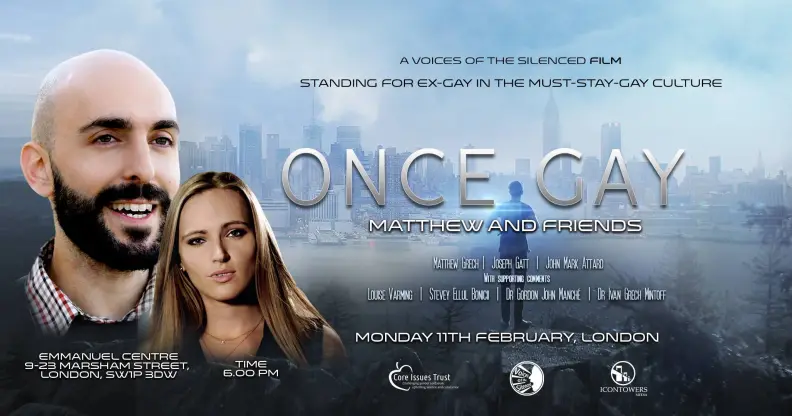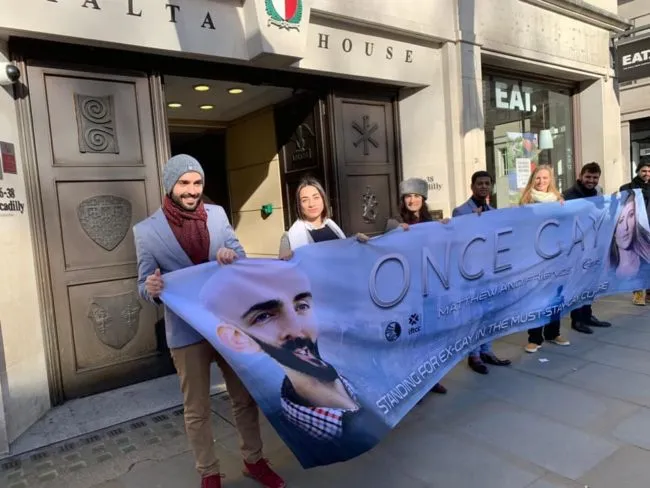Inside the doomed world of gay ‘cure’ therapy

The poster for the London premiere of gay cure film Once Gay
Things are not well in the gay cure therapy movement.
After decades of operating largely unchecked, governments around the world are finally starting to notice, and take action.
15 US states have enacted laws banning the practise for minors, while Malta became the first European country to do so in 2016. In the UK, the government is planning new measures to stamp out the practice with broad cross-party support.
In the face of hostility, however, believers vow to go on.
Core Issues Trust, the only conversion therapy practitioner to publicly advertise in the UK, is releasing gay cure advocacy film Once Gay this week, in a bid to promote the practice.
The film’s central London launch was hosted on Monday at Emmanuel Evangelical Church—one of the last remaining sanctuaries for the group, who have seen events at secular venues repeatedly cancelled in recent years.
Gay cure poster boy admits he is still attracted to men
Once Gay tells the story of Matthew Grech, a singer who appeared on the Maltese version of the X Factor before speaking out about his ‘ex-gay’ lifestyle.

Once Gay tells the story of singer Matthew Grech.
In the film, Grech speaks about his conversion to evangelical Christianity, his decision to stop having gay relationships, and his hope to be cured of same-sex attraction.
For the latest gay cure poster boy, however, Grech is candid about the fact that he hasn’t actually been cured of anything yet.
Asked if he still feels attracted to men, Grech tells PinkNews: “I do, yes… if I had to put it another way, I don’t think I have experienced a specific connection with a woman.”
He adds: “For some people, success is if your sexual orientation literally changes, but for some people, success is literally controlling their own thoughts so they don’t go in a specific direction.
“Just because my flesh has not changed, does not mean I have not changed.”
Grech is still confident that God will eventually change his feelings eventually, however.
“As I stay obedient to God”, he explains, “I believe I will experience a tremendous difference and change in my feelings as well.”
Gay cure therapy has lost supporters
We don’t have to look far to see what the future could hold for Grech, though.
David Matheson, who literally wrote the book on conversion therapy in the Mormon Church, came out as gay in January and said the practise should be banned.
Norman Goldwasser, who pioneered conversion therapy treatments in Orthodox Jewish faith groups, admitted using gay hook-up apps last year under the username HotnHairy72.
Even former ex-gay pin-up Michael Glatze, whose life was fictionalised in the film I Am Michael, has quit his evangelical church and now reportedly identifies as bisexual.
Grech does not seem concerned, however.
”If somebody else’s experience goes bad,” he responds, “it could be for a gazillion reasons.”
“The truth is, we are all on an individual journey, and just because it failed for that guy, doesn’t mean it would fail for me.”
Core Issues Trust exec Mike Davidson is more evasive on the defections from the very top of the global movement.
He responds: “There are people who have been inconsistent in any profession, from any point of view… it doesn’t mean there is not validity in holding a point of view.”
Gay cure therapy has a real impact
It’s surprisingly easy to get sucked into the world with a soundtrack of Grech’s Coldplay-esque worship music, full of lyrics about breaking chains, without confronting the harmful concept that Core Issues Trust is promoting.
Nearly every medical and therapeutic body in the world has disavowed gay cure therapy, with many warning of a potential link between the practise and depression, self-harm and even suicide.
When challenged on the weight of expert consensus, Mike Davidson’s answers are straight from the populist political playbook: “You know, so what? It’s one ideological point of view… we are going in a different direction.”
Davidson, who holds no medical or therapeutic qualifications, adds: ”Folks on a side different to my own constantly talk about potential harm, because they know they can’t talk about harm, they can only talk about potential harm.
“Paracetamol is fatal if you misuse it, but we haven’t banned paracetamol… you don’t ban things, you don’t deny one group of people the right and freedom, and say you are giving rights and freedoms to another.”
Who funds Core Issues Trust?
While Davidson is the figurehead for his work, he is far from alone.
The industry is propped up by an intricate network of interconnected groups rooted in evangelical Christianity.
Davidson leads the Core Issues Trust, while his co-director Andrea Williams is also head fundamentalist action groups Christian Concern and Christian Legal Centre.
The event also bears the banners of International Federation for Therapeutic and Counselling Choice, set up by Davidson to work on the issue internationally. The group is already lobbying in Malta on Grech’s behalf, claiming that Malta’s gay cure ban violates human rights laws.

Matthew Grech protests outside the Malta High Commission in London. (Core Issues Trust)
The slick film production and swanky white wine-and-canapés launch also raise questions about the funding for Davidson’s work.
Though it runs frequent events in London, Core Issues Trust is registered as a charity in Northern Ireland, where its accounts show £67,400 in annual donations despite little apparent public fundraising.
Asked who is funding the production, Davidson responds: “Supporters, people like this. Individuals. There may be some businesses that will give to us.”
Before I even ask the next question, Davidson heads it off: “We do not have any funding from the United States of America.”
He denies links to the Heritage Foundation or Alliance Defending Freedom, US-based evangelical groups known for exerting a global influence.
While its funding remains oblique, the private influence of the group should not be underestimated.
Around 150 people are in attendance on the night; a mixture of die-hard supporters, evangelicals, curious strangers, and an unlikely network of allies.
At the reception, a local imam explains that he wants to learn more about conversion therapy to adapt the model for Islam.
Paradoxically close to him stands Alan Craig, the UK Independence Party’s Families and Children spokesperson, fresh from outlining the party’s tough new anti-Muslim, anti-LGBT manifesto.
While some attendees seem to genuinely believe the group’s efforts can change policy on the issue, several privately admit that the UK’s ban on the practise seems inevitable.
The government, for its part, is also increasingly firm on the issue.
Speaking to PinkNews about our findings at the event meters away from the Home Office, equalities minister Baroness Williams reaffirmed need for a ban.
She said: “I think it’s really shocking.
“It’s obviously more widespread than we first thought, and I think that’s why it’s good to take a proper look at it, and see where it exists.
“We need to make sure that where it exists, it is ended.”
But what real impact a ban would have remains an open question. Investigations across country have found gay cures offered on the fringes of faith groups, out of public view and away from any accountability.
It is in the shadows that the real harm of gay cure therapy take place.
Not at central London media launches, but at local churches, synagogues and mosques, where struggling LGBT+ people are coaxed down a path that too often ends in repression, denial, and tragedy.
And unlike Once Gay, it’s a horror that gay cure advocates don’t want you to see on film.

